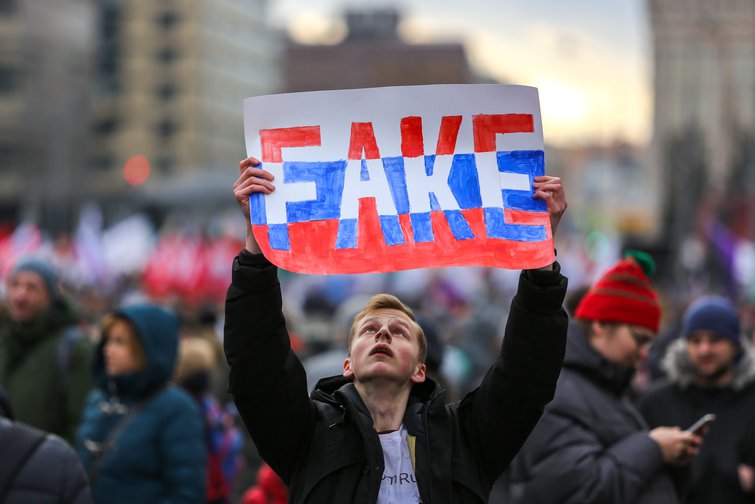
The fight against disinformation: a proposal for regulation
Xnet proposes legislation against fake news and manipulation of information both OFFLINE AND ONLINE and in defense of democracy and fundamental freedoms

Last year, we published the book “#FakeYou, Fake News y Desinformación - Gobiernos, partidos políticos, mass media, corporaciones, grandes fortunas: monopolios de la manipulación informativa y recortes de la libertad de expresión” [#FakeYou, Fake News and Disinformation – Governments, political parties, mass media, corporations, big fortunes: the monopoly of information manipulation and threats to freedom of expression] (https://xnet-x.net/informe-fake-news-desinformacion/).
Here we present the proposal for regulation that leads on from that research. It aims to provide an off-the-shelf model for legislators.
As we showed in the aforementioned book, the public and legislative policies used in the fight against disinformation that have been pursued both in Spain and in other countries because of (or we should say, with the excuse of) the so-called “new” phenomenon of fake news, often actually serve to distract from the real solution:
1) They attack the Internet as if the Internet were the only source of toxic disinformation;
We’ve got a newsletter for everyone
Whatever you’re interested in, there’s a free openDemocracy newsletter for you.
2) They attempt to limit users’ freedom of expression, letting the real promoters of collective disinformation off the hook in the process.
It is important that we respect the fundamental rights of freedom of expression and information not only because they are rights, the backbone of any state that would claim to be democratic, but also because they are not the source of the problem of disinformation and fake news. If anything, they are the solution.
It would be fair to say that people’s use of their freedom of expression is far from perfect, of course, yet it is a fundamental right, and one that will improve in the way we use it insofar as we are able to exercise it without asymmetries; what isn’t a fundamental right is what business is doing with the content of communications. Like any business or institutional practice, there must be limits when it harms the general interest.
The measures and the narrative that lay the groundwork for liberticidal legislation focus on Internet users and embrace a logic of control and censorship by either public or private players. These policies neglect the subjects who actually generate, and benefit from, disinformation the most. In #FakeYou, we clearly demonstrated that all paths to the source of systemic disinformation lead to the same place: political parties and their structures of interest and influence, englobing other powerful, privileged players, from institutions to media and companies.
This why we propose a radical shift in the approach taken to address the issue, focussing on the idea of the profit generated by disinformation. This allows us to be objective and efficient, and to move away from normative designs led mainly by the temptation to meddle with fundamental rights or to establish an official Truth.
While there is a general consensus that systematic disinformation is harmful to democracy, we should also consider that there should not be an industry founded on this harmful fact. At the same time, we also emphasise the idea of institutional responsibility and dereliction of duty as something that is both quantifiable and punishable.
We propose a proactive approach that corrects asymmetries of power and empowers the public.
1) Holding the mass producers of disinformation fully to account so that the creation of viral disinformation does not end up being a viable business model for them;
2) Expanding the monitoring and verification capacities of the public as a whole, through protocols for open, transparent access to information and the way it is produced.
Exposing the way in which information is created will in turn make verification open to everyone.
We need to make proactive checks as to the veracity of information compulsory for the major generators, that is, the largest investors in disinformation, whether they be public or private (it bears repeating: governments, institutions, political parties, mass media, corporations, and celebrities business). This will mean exposing the way in which information is created, in turn making verification open to everyone.
Currently, the public is required to verify information without giving them the proper tools to do so. How can we verify and avoid falling for fake news if the person producing the information and the news doesn’t give us any clues as to the source or data behind them? The public must have at their disposal the detailed elements that enable them to verify facts in a way that is quick, accessible, distributed and open.
It needs to be stressed, though, that such actions must not only affect online intermediaries (content platforms and social networks), but the whole of the investment chain. Focusing all regulation on online platforms, as currently happens, has very clearly resulted in those platforms safeguarding their commercial interests and reducing their legal risks by applying the curtailment of users’ freedom of expression, resulting in moves towards a single acceptable pensée unique and automated censorship.
There is nothing new about this dynamic: since the dawn of time, governments have used intermediary structures to implement surveillance and censorship policies. Control over what people say and do is often delegated to “private parties”. They ensure that their users do not “commit” acts that upset the powers-that-be, and in return they receive a wider margin of movement and freedom for their business. This is exactly what is happening now.
The most surprising thing is that there is also ample, even redundant legal groundwork for taking steps in the right direction. By applying European regulations in certain aspects, and taking a more expansive reading of their objectives, it would be possible to attack the root of the problem without undermining rights and freedoms. But this simply isn’t happening.
Whoever finances dissemination of fake news, or orders it from an institution, is responsible for the disinformation.
The common denominator of “influential opinion-makers”, and one that would justify the adoption of a tougher regime, is their ability to influence public debate. So the main focus of our proposal is: whoever finances dissemination of fake news, or orders it from an institution, is responsible for the disinformation. Punishment for disinformation must fall on the mass producers and participants in the disinformation business; we must also remember that, despite the many subjects who profit from the dissemination of fake news, this practice is especially harmful to society in the case of political institutions and parties, since they should be responsible for creating the regulatory framework to attack the problem, but fail to do so as it harms them in terms of their power and influence.
Our proposal, on the other hand, is in line with the guidelines set forth by the Council of Europe and the Joint Declaration on Freedom of Expression and “Fake News”, Disinformation and Propaganda by the UN Special Rapporteur on Freedom of Opinion and Expression; the Representative on Freedom of the Media of the Organization for Security and Co-operation in Europe (OSCE); the OAS Special Rapporteur on Freedom of Expression; and the African Commission on Human and Peoples’ Rights Special Rapporteur on Freedom of Expression and Access to Information (ACHPR).
What’s more, we can refer to the statements of the European authorities when they say that “democracy in the European Union depends on the existence of free and independent media” and call on public authorities to avoid censorship and guarantee the conditions for inclusive, pluralistic public debate by “avoiding censorship of critical, satirical, dissenting or scandalous content and by respecting the principles of a neutral, open, safe and reliable internet”.
Or when they recommend actions to increase the transparency of funding sources “to identify who is behind certain types of information and to clearly identify sponsored content, especially political content”. Or when they condemn covert commercial communication and ask that advertising or the profits of influencers not be used to finance disinformation.
Or when they suggest “increasing transparency as to the origin of information and how it is produced, sponsored, disseminated and directed”.
All these good intentions are not consistent with the fact that only some players (platforms —or rather their users— and sometimes the media) and not all agents involved are held accountable. [1]
Monitoring compliance with journalistic ethics takes on added importance.
As for the media, the European Court of Human Rights has labelled the function the press plays in a democratic society as that of a watchdog. In the case of Stoll v. Switzerland, the Strasbourg Court openly insisted that the media hold a position of power as “not only do they inform, they also suggest by the way in which they present the information how it is to be assessed. In a world in which the individual is confronted with vast quantities of information circulated via traditional and electronic media and involving an ever-growing number of players, monitoring compliance with journalistic ethics takes on added importance” [bold added by author for emphasis].
In the light of quotes from such illustrious figures, our proposal is not at all radical. We therefore propose legislators consider it and join us in getting to work on it as soon as possible.
The full text can be found here:
https://xnet-x.net/ley-fakeyou/
Here is a brief summary:
Measures against disinformation and information manipulation both OFFLINE AND ONLINE
In defence of democracy and fundamental freedoms
Our proposal is to draw a clear distinction between the free expression of opinion on the one hand and the business of information and institutional information on the other.
To a large extent, it aims to broaden the scope of application of existing or planned regulations at the international and European levels, eliminating the biases that segregate the Internet and curtail freedom of expression and information:
- Apply a “follow-the-money” approach (aimed at business or institutions that have neglected their duties) as opposed to passing judgement on content (do not interfere with freedom of opinion, nor create a Ministry of Truth).
- Update the verification and fact-checking protocols included in the deontological codes of journalism and transform them into law: this is not about setting a single, approved Truth, but about applying objective parameters to verify truthfulness (something which is already included in current legislation).
- Extend and enforce verification obligations that apply to journalists and newspapers to other sectors where the flow of information involves profit or institutional benefit, including political parties, authorities, governments, corporations and other influential opinion-makers.
- Display this mandatory application through labelling. This allows anyone to verify the information, something which is currently required of the population in spite of the fact that they are not offered the tools to do so.
- Update other tangential regulations, eliminate technophobic bias in policies and incorporate effective sanctioning regimes.
In the definition of the subjects to which this Law should apply, we indicate institutions, political parties, systemic private entities with a massive impact on the population, on the one hand, and businesses, including the media, communication companies, celebrities and opinion-makers, and any other person who invests or receives money for information to be more visible than it would have been if it were simply issued by someone.
Two obligations we indicate for these subjects: the duty to verify the truthfulness of content and to allow verification by the recipient.
Truthfulness is not to be taken as a synonym for THE Truth. Here truthfulness is used as defined in Article 20 of the Spanish Constitution (similar to the definition in other countries): it requires that the information disseminated be truthful. This implies the possibility of disseminating erroneous information but requires a duty of care on the part of the person informing. The person informing must transmit information on facts that have been contrasted beforehand with objective data that does not encourage rumours or insinuations. Furthermore, “the duty of care in reasonably verifying the truthfulness of the information is not satisfied by pure and generic reference to undetermined sources” (SSTC 172/1990 and 21/2000).
A communication that claims to be “information” must therefore use verification protocols in its preparation. In theory, the jurisprudence already defines the responsibility of professional information providers to check the information before publishing it. There are deontological and ethical codes that apply to the journalism sector that have detailed protocols of action for such verification. It is now a matter of expanding the subjects that these apply to, with special emphasis on political parties, institutions and online and offline businesses working in communication.
On the other hand, when we talk about allowing verification by the recipient, we are talking about making the verification process a traceable one.
When information is offered as part of a business model (because it is offered in exchange for payment) or is offered by institutions, it is no longer a form of freedom of expression, and there must be an obligation of transparency to enable verification, as happens, for example, with food. This is a form of labelling.
A table with basic information for verification should be included with the published information. The responsibility for the accuracy of the labelling should be borne by both those who pay for that information to become viral and those who receive payment. Its application must be accompanied by a strong sanctioning regime as happens with food.
This has two main objectives:
– To check whether the verification has actually been carried out.
– To allow anyone who reads the information to check the verification for themselves.
People are constantly accused of not checking the information they share for its truthfulness. They are blamed for failing to do something they are not given the tools to do. Labelling would provide such a tool.
This dynamic can also generate a positive chilling effect so that all information providers who claim to be professional and reliable will apply these protocols to ensure maximum quality.
In practice, the aim of such a table is to answer simple verification questions informed by existing “types of misinformation” and “parameters of deontological codes”, for example: Does the information have a source or none at all, meaning it’s made up? Is the article about a particular company paid for by that same company or political party? Has the source been contrasted, or does it simply act as a platform for a source, publishing what it wants to publish unaltered; If one source says it’s raining and another says it isn’t, has anyone looked out the window to see which of the two statements is correct, or have they both been published in the name of (non-existent) information neutrality? Etc.
We look forward, then, to working together to enact the change needed to defend the public’s rights, and in this spirit, we publish our draft regulation.
[See the proposed label and full draft regulation here https://xnet-x.net/ley-fakeyou/].
---
[1] More:
In its 1994 Recommendation on measures to promote transparency in the media, the Committee of Ministers of the Council of Europe reiterated that media transparency obligations are necessary to enable the public to form an opinion on the value to be attached to information, ideas or opinions disseminated by the media. This Recommendation sets out, inter alia, specific measures to ensure transparency in the press. It is therefore recommended that a legislative framework be adopted that forces the press to disseminate information relating to five categories:
- - First category: information regarding the identity of the persons or entities involved in the editorial structure, as well as the nature and degree of their participation.
- - Second category: information on interests held in other media outlets by the editorial structure or the persons and entities involved.
- - Third category: information on persons or entities capable of exerting a significant influence on the editorial line.
- - Fourth category: information on any editorial policy position or the political orientation of newspapers and publications.
- - Fifth category: information on the financial results of the publishing structure and distribution of publications.
This Recommendation does not distinguish between forms of media, and therefore it should be understood that its considerations apply to all without distinction.
Read more
Get our weekly email




Comments
We encourage anyone to comment, please consult the oD commenting guidelines if you have any questions.